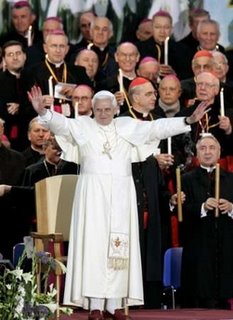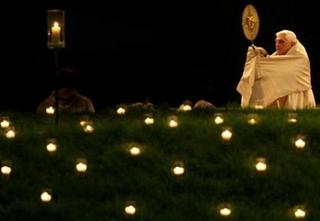celebrations have concluded but as I put these posts in the archives of my blog I felt that the
section would not be complete without Eucharistic Adoration mentioned.
On August 20, 2005, many, many people remained in an all-night Eucharistic Adoration Vigil to adore Our Lord who is truly present (Body, Blood, Soul, and Divinity) in the Eucharist.
is indeed a great gift and my favorite form of prayer.
.
Dear young friends,
In our pilgrimage with the mysterious Magi from the East, we have arrived at the moment which St Matthew describes in his Gospel with these words: "Going into the house (over which the star had halted), they saw the child with Mary his mother, and they fell down and worshipped him" (Mt 2: 11). Outwardly, their journey was now over. They had reached their goal.
But at this point a new journey began for them, an inner pilgrimage which changed their whole lives. Their mental picture of the infant King they were expecting to find must have been very different. They had stopped at Jerusalem specifically in order to ask the King who lived there for news of the promised King who had been born. They knew that the world was in disorder, and for that reason their hearts were troubled.
They were sure that God existed and that he was a just and gentle God. And perhaps they also knew of the great prophecies of Israel foretelling a King who would be intimately united with God, a King who would restore order to the world, acting for God and in his Name.
It was in order to seek this King that they had set off on their journey: deep within themselves they felt prompted to go in search of the true justice that can only come from God, and they wanted to serve this King, to fall prostrate at his feet and so play their part in the renewal of the world. They were among those "who hunger and thirst for justice" (Mt 5: 6). This hunger and thirst had spurred them on in their pilgrimage - they had become pilgrims in search of the justice that they expected from God, intending to devote themselves to its service.
Even if those who had stayed at home may have considered them Utopian dreamers, they were actually people with their feet on the ground, and they knew that in order to change the world it is necessary to have power. Hence, they were hardly likely to seek the promised child anywhere but in the King's palace. Yet now they were bowing down before the child of poor people, and they soon came to realize that Herod, the King they had consulted, intended to use his power to lay a trap for him, forcing the family to flee into exile.
The new King, to whom they now paid homage, was quite unlike what they were expecting. In this way they had to learn that God is not as we usually imagine him to be. This was where their inner journey began. It started at the very moment when they knelt down before this child and recognized him as the promised King. But they still had to assimilate these joyful gestures internally.
They had to change their ideas about power, about God and about man, and in so doing, they also had to change themselves. Now they were able to see that God's power is not like that of the powerful of this world. God's ways are not as we imagine them or as we might wish them to be.
God does not enter into competition with earthly powers in this world. He does not marshal his divisions alongside other divisions. God did not send 12 legions of angels to assist Jesus in the Garden of Olives (cf. Mt 26: 53). He contrasts the noisy and ostentatious power of this world with the defenceless power of love, which succumbs to death on the Cross and dies ever anew throughout history; yet it is this same love which constitutes the new divine intervention that opposes injustice and ushers in the Kingdom of God.
God is different - this is what they now come to realize. And it means that they themselves must now become different, they must learn God's ways.
They had come to place themselves at the service of this King, to model their own kingship on his. That was the meaning of their act of homage, their adoration. Included in this were their gifts - gold, frankincense and myrrh - gifts offered to a King held to be divine. Adoration has a content and it involves giving. Through this act of adoration, these men from the East wished to recognize the child as their King and to place their own power and potential at his disposal, and in this they were certainly on the right path.
By serving and following him, they wanted, together with him, to serve the cause of good and the cause of justice in the world. In this they were right.
Now, though, they have to learn that this cannot be achieved simply through issuing commands from a throne on high. Now they have to learn to give themselves - no lesser gift would be sufficient for this King. Now they have to learn that their lives must be conformed to this divine way of exercising power, to God's own way of being.
They must become men of truth, of justice, of goodness, of forgiveness, of mercy. They will no longer ask: how can this serve me? Instead, they will have to ask: How can I serve God's presence in the world? They must learn to lose their life and in this way to find it. Having left Jerusalem behind, they must not deviate from the path marked out by the true King, as they follow Jesus.
Dear friends, what does all this mean for us?
What we have just been saying about the nature of God being different, and about the way our lives must be shaped accordingly, sounds very fine, but remains rather vague and unfocused. That is why God has given us examples. The Magi from the East are just the first in a long procession of men and women who have constantly tried to gaze upon God's star in their lives, going in search of the God who has drawn close to us and shows us the way.
It is the great multitude of the saints - both known and unknown - in whose lives the Lord has opened up the Gospel before us and turned over the pages; he has done this throughout history and he still does so today. In their lives, as if in a great picture-book, the riches of the Gospel are revealed. They are the shining path which God himself has traced throughout history and is still tracing today.
My venerable Predecessor Pope John Paul II, who is with us at this moment, beatified and canonized a great many people from both the distant and the recent past. Through these individuals he wanted to show us how to be Christian: how to live life as it should be lived - according to God's way. The saints and the blesseds did not doggedly seek their own happiness, but simply wanted to give themselves, because the light of Christ had shone upon them.
They show us the way to attain happiness, they show us how to be truly human. Through all the ups and downs of history, they were the true reformers who constantly rescued it from plunging into the valley of darkness; it was they who constantly shed upon it the light that was needed to make sense - even in the midst of suffering - of God's words spoken at the end of the work of creation: "It is very good".
One need only think of such figures as St Benedict, St Francis of Assisi, St Teresa of Avila, St Ignatius of Loyola, St Charles Borromeo, the founders of 19-century religious orders who inspired and guided the social movement, or the saints of our own day - Maximilian Kolbe, Edith Stein, Mother Teresa, Padre Pio. In contemplating these figures we learn what it means "to adore" and what it means to live according to the measure of the Child of Bethlehem, by the measure of Jesus Christ and of God himself.
The saints, as we said, are the true reformers. Now I want to express this in an even more radical way: only from the saints, only from God does true revolution come, the definitive way to change the world.
In the last century we experienced revolutions with a common programme - expecting nothing more from God, they assumed total responsibility for the cause of the world in order to change it. And this, as we saw, meant that a human and partial point of view was always taken as an absolute guiding principle. Absolutizing what is not absolute but relative is called totalitarianism. It does not liberate man, but takes away his dignity and enslaves him.
It is not ideologies that save the world, but only a return to the living God, our Creator, the guarantor of our freedom, the guarantor of what is really good and true. True revolution consists in simply turning to God who is the measure of what is right and who at the same time is everlasting love. And what could ever save us apart from love?
Dear friends! Allow me to add just two brief thoughts.
There are many who speak of God; some even preach hatred and perpetrate violence in God's Name. So it is important to discover the true face of God. The Magi from the East found it when they knelt down before the Child of Bethlehem. "Anyone who has seen me has seen the Father", said Jesus to Philip (Jn 14: 9). In Jesus Christ, who allowed his heart to be pierced for us, the true face of God is seen. We will follow him together with the great multitude of those who went before us. Then we will be travelling along the right path.
This means that we are not constructing a private God, we are not constructing a private Jesus, but that we believe and worship the Jesus who is manifested to us by the Sacred Scriptures and who reveals himself to be alive in the great procession of the faithful called the Church, always alongside us and always before us.
There is much that could be criticized in the Church. We know this and the Lord himself told us so: it is a net with good fish and bad fish, a field with wheat and darnel.
Pope John Paul II, as well as revealing the true face of the Church in the many saints that he canonized, also asked pardon for the wrong that was done in the course of history through the words and deeds of members of the Church. In this way he showed us our own true image and urged us to take our place, with all our faults and weaknesses, in the procession of the saints that began with the Magi from the East.
It is actually consoling to realize that there is darnel in the Church. In this way, despite all our defects, we can still hope to be counted among the disciples of Jesus, who came to call sinners.
The Church is like a human family, but at the same time it is also the great family of God, through which he establishes an overarching communion and unity that embraces every continent, culture and nation. So we are glad to belong to this great family that we see here; we are glad to have brothers and friends all over the world.
Here in Cologne we discover the joy of belonging to a family as vast as the world, including Heaven and earth, the past, the present, the future and every part of the earth. In this great band of pilgrims we walk side by side with Christ, we walk with the star that enlightens our history.
"Going into the house, they saw the child with Mary his mother, and they fell down and worshipped him" (Mt 2: 11). Dear friends, this is not a distant story that took place long ago. It is with us now. Here in the Sacred Host he is present before us and in our midst. As at that time, so now he is mysteriously veiled in a sacred silence; as at that time, it is here that the true face of God is revealed. For us he became a grain of wheat that falls on the ground and dies and bears fruit until the end of the world (cf. Jn 12: 24).
He is present now as he was then in Bethlehem. He invites us to that inner pilgrimage which is called adoration. Let us set off on this pilgrimage of the spirit and let us ask him to be our guide. Amen.
© Copyright 2005 - Libreria Editrice Vaticana
















